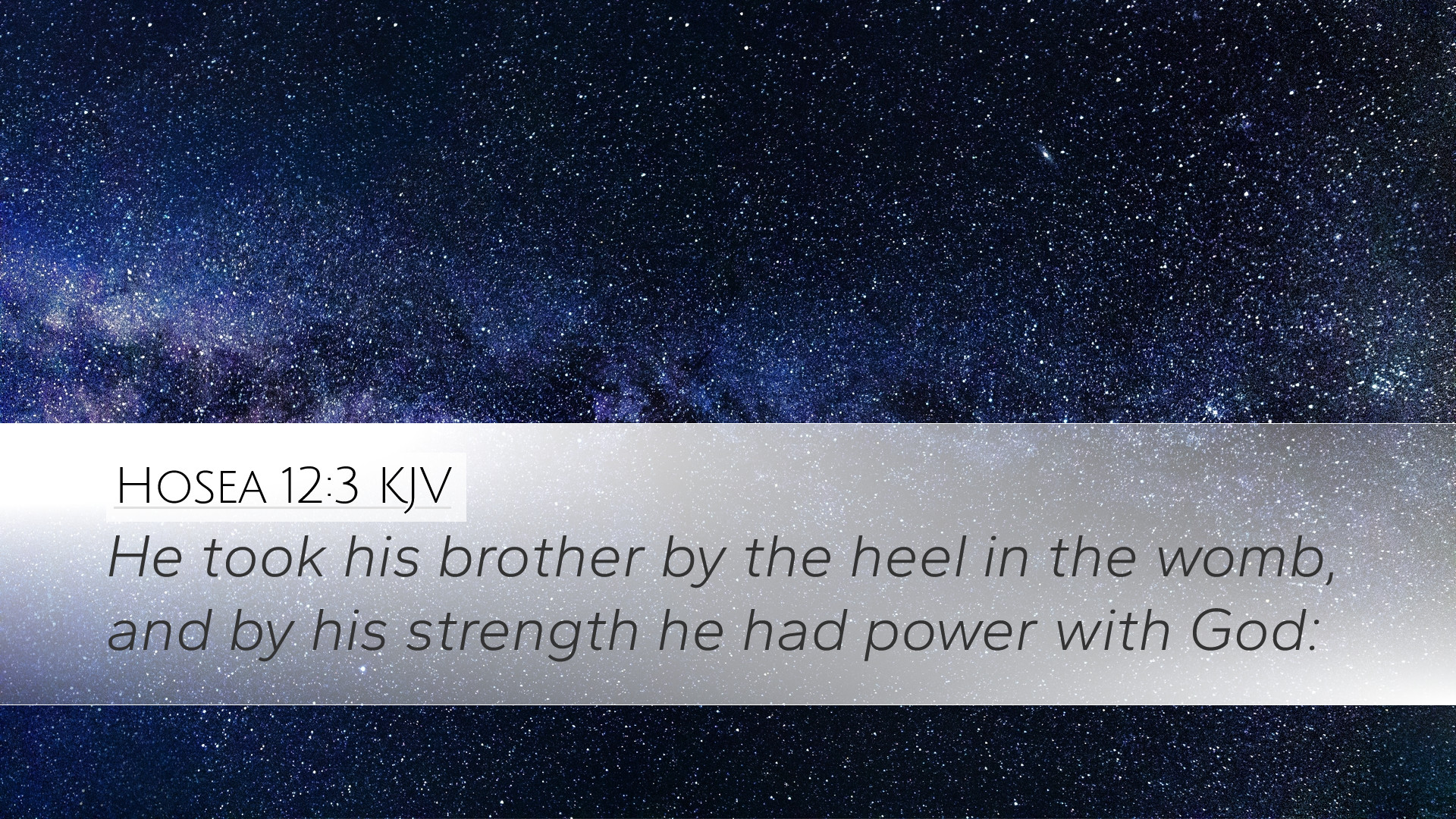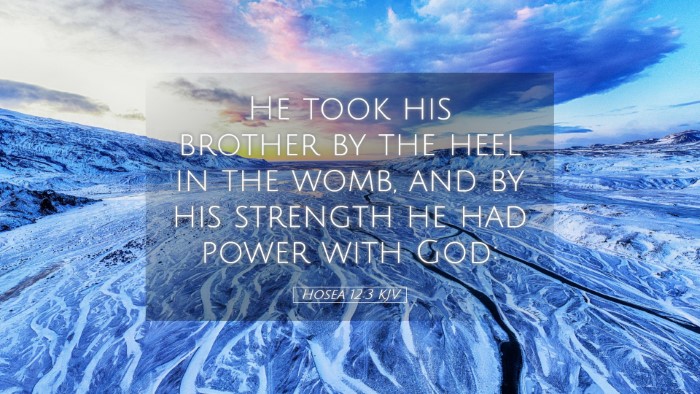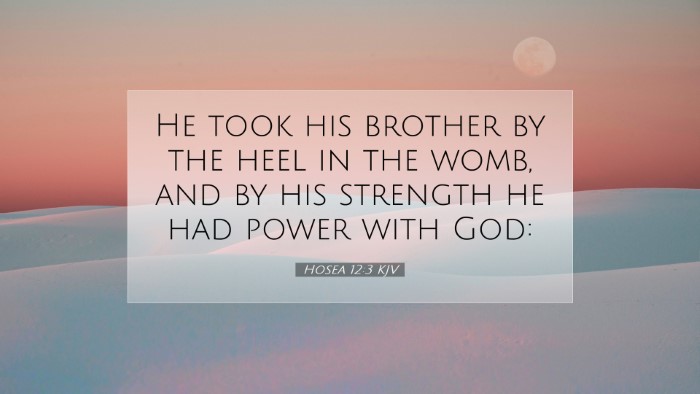Old Testament
Genesis Exodus Leviticus Numbers Deuteronomy Joshua Judges Ruth 1 Samuel 2 Samuel 1 Kings 2 Kings 1 Chronicles 2 Chronicles Ezra Nehemiah Esther Job Psalms Proverbs Ecclesiastes Song of Solomon Isaiah Jeremiah Lamentations Ezekiel Daniel Hosea Joel Amos Obadiah Jonah Micah Nahum Habakkuk Zephaniah Haggai Zechariah MalachiHosea 12:3
Hosea 12:3 KJV
He took his brother by the heel in the womb, and by his strength he had power with God:
Hosea 12:3 Bible Commentary
Commentary on Hosea 12:3
Hosea 12:3 states: "He took his brother by the heel in the womb, and by his strength he had power with God." This verse refers to Jacob's struggle with his brother Esau at birth, and it introduces significant themes regarding struggle, divine favor, and Israel's relationship with God.
Contextual Overview
This verse is part of a larger narrative within Hosea’s prophetic messages, which address the sinful practices of Israel and God's enduring love and promise to His people. The verses surrounding Hosea 12:3 highlight Israel's relational complexity with God, underscoring both criticism and the potential for restoration.
Insights from Matthew Henry's Commentary
Matthew Henry emphasizes the metaphorical implications of Jacob's actions. He points out that Jacob's grasping of Esau's heel symbolizes the struggle for superiority and the pursuit of divine blessing. This struggle continues throughout Jacob's life, ultimately leading to his wrestling with God at Peniel. Henry interprets this to mean that God's people often engage in struggles that test their faith but also lead to blessings. He remarks:
"Those who strive with God shall overcome, for they are born of God, and as such, they conquer."
Henry also sees this verse as an acknowledgment of God's grace amid human frailty and deception. He notes that while Jacob initially acted in cunning, God's purposes prevail, culminating in Jacob's encounter with the divine, which reshapes his identity.
Insights from Albert Barnes' Notes
Albert Barnes expounds on the significance of the phrase "by his strength he had power with God." He elucidates that this reflects Jacob's persistence in seeking a blessing from God, symbolizing the relentless pursuit of divine favor. Barnes writes:
"The key to Jacob's victory is found in his unwillingness to let go of God, reflecting a vital principle of faith."
Moreover, Barnes highlights the broader implications of Jacob's story as a microcosm of Israel's historical journey—a nation often at odds with God, yet called to persevere in relationship with Him. He correlates Jacob's struggle with Israel's identity and their eventual triumph through God's grace.
Insights from Adam Clarke's Commentary
Adam Clarke's insight into this verse provides a theological depth, as he relates Jacob's situation to Israel's history. Clarke explains that Jacob’s act of grasping his brother is an allegory of Israel's inconsistent faithfulness to God, as the nation often sought to gain blessings through its own strength rather than divine reliance. He notes:
"Let us not forget that our struggles often serve as prelude to divine encounters that can transform our lives."
Clarke compares Jacob's wrestling with God to the spiritual engagements Christians face today, emphasizing that spiritual struggles are integral to growth and character development. He invites the reader to consider their own struggles within the context of divine purpose and transformation.
Thematic Reflections
- Struggle and Identity: The passage serves as a reminder that our struggles often shape our identities in God's narrative.
- Divine Favor: Despite human shortcomings, God's choice and blessing can prevail, depicting the redemptive nature of His love.
- Faith and Perseverance: The act of wrestling with God implies a deeper relationship; perseverance in faith is key to receiving God's blessings.
Practical Applications
For pastors and educators, this verse can be an invaluable teaching tool. Highlighting themes of struggle and resolution can encourage congregations to embrace their spiritual journeys. Encourage individuals to perceive their ‘wrestling’ not as futile, but a means to grow closer to God. The transformation of Jacob serves as a powerful testament to God’s capability to redeem our flaws into strengths.
Conclusion
Hosea 12:3 encapsulates the human experience of struggle in faith, the depths of God’s grace, and the journey toward spiritual maturity. The insights gleaned from Matthew Henry, Albert Barnes, and Adam Clarke collectively reinforce the narrative that even in our weakest moments, God’s strength can lead us to triumph. Ultimately, this verse encourages believers to engage deeply in their relationship with God and to strive toward a deeper understanding of His divine plans.


